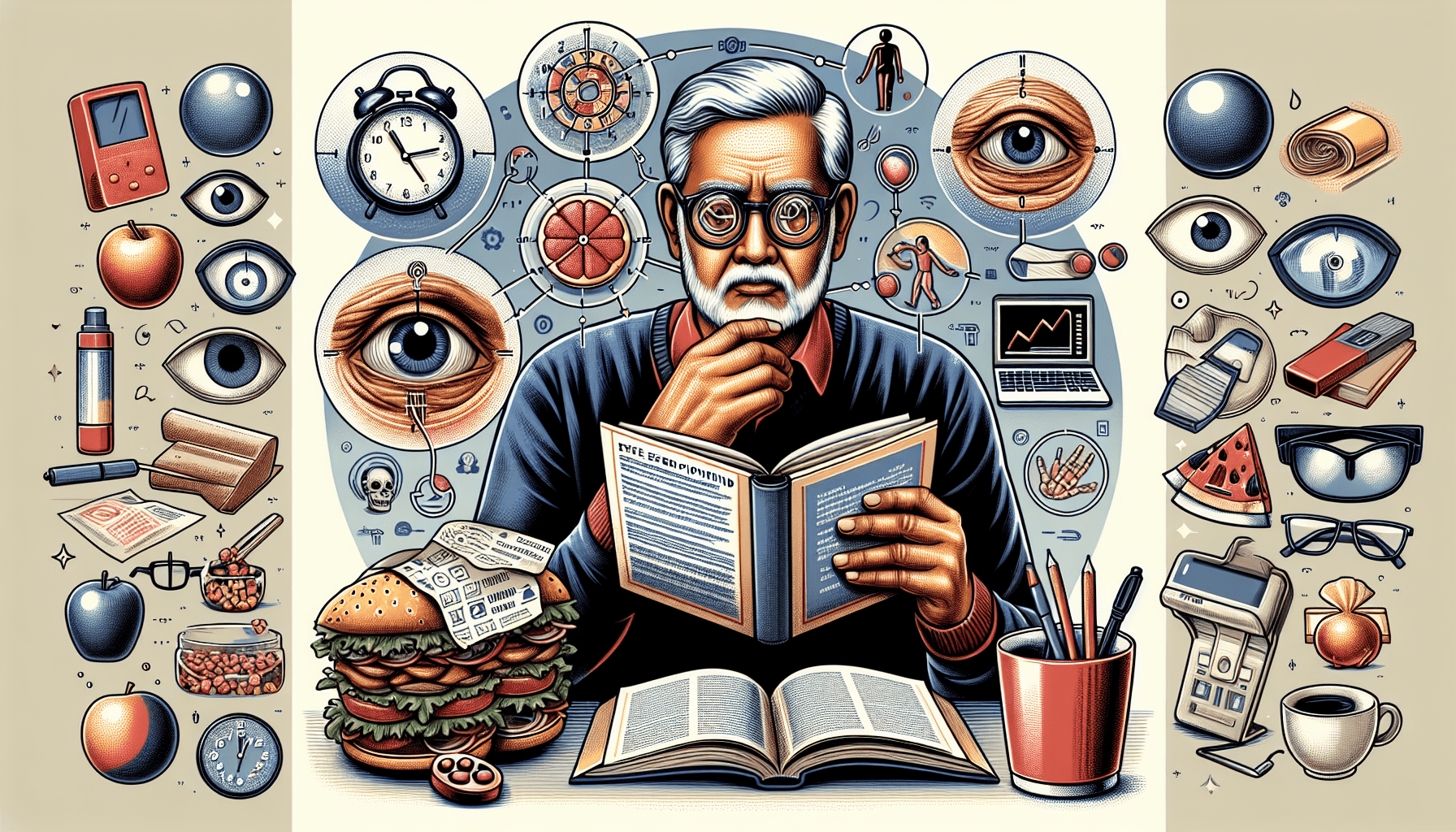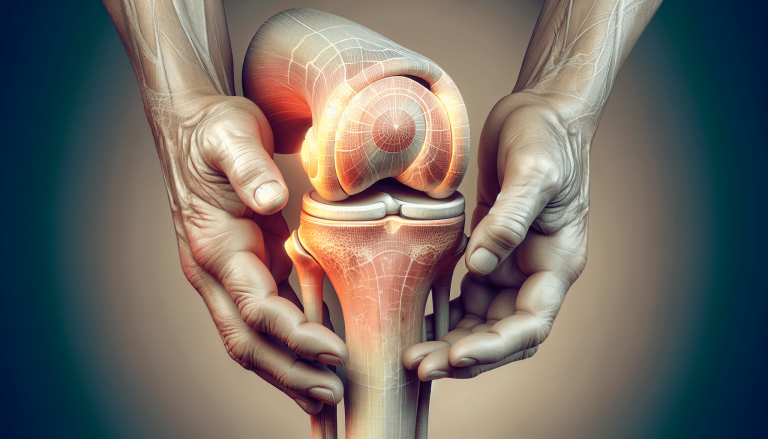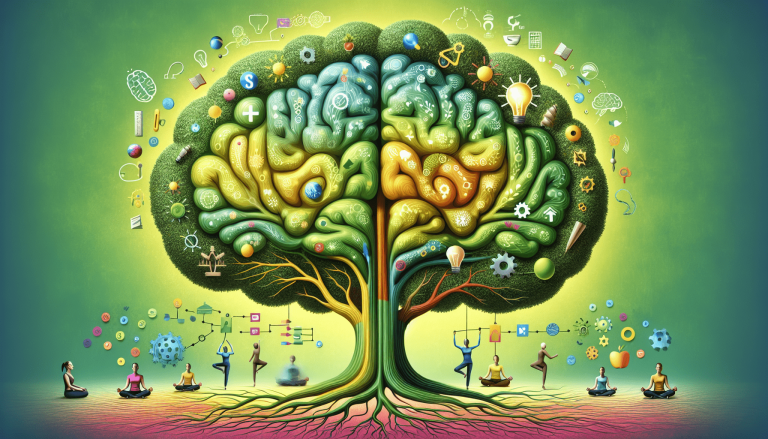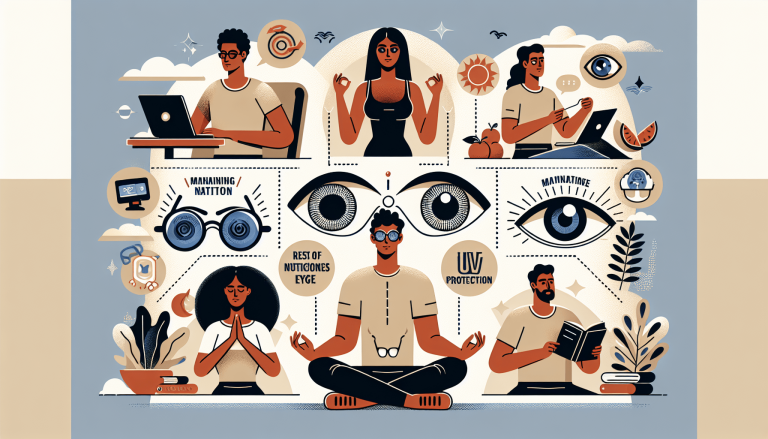How Can I Improve My Aging Eyesight?
If you find yourself wondering how to improve your aging eyesight, this article is here to offer you some helpful tips and techniques. As we age, our eyesight tends to deteriorate, making it harder to read small print or see clearly at a distance. But fear not, because there are simple and effective ways to enhance your vision and maintain good eye health. Whether it’s incorporating certain foods into your diet, practicing eye exercises, or using corrective measures like glasses or contacts, this article will guide you through the various options available to improve your aging eyesight. So let’s get started on the path to better vision!

Diet and Nutrition
Consume foods rich in vitamins and minerals
A healthy diet plays a crucial role in maintaining good eyesight, especially as we age. Including foods that are rich in vitamins and minerals can provide the necessary nutrients to support eye health. Incorporate a variety of fruits and vegetables into your meals, such as spinach, carrots, and oranges, as they are packed with vitamins A, C, and E, which are essential for maintaining healthy eyes. Additionally, foods like nuts, seeds, and fish are excellent sources of minerals like zinc and omega-3 fatty acids, which promote good eye health.
Include omega-3 fatty acids in your diet
Omega-3 fatty acids are known for their numerous health benefits, including supporting eye health. These essential fats can be found in fish, such as salmon and tuna, as well as in chia seeds and flaxseeds. Including omega-3 fatty acids in your diet can help protect against age-related macular degeneration (AMD) and dry eyes. If you have difficulty consuming enough omega-3s through your diet, consider taking fish oil or omega-3 supplements after consulting with your healthcare professional.
Stay hydrated
Staying hydrated is not only important for overall health but also for maintaining good eye health. Dehydration can cause dry eyes and increase eye strain, especially when spending long periods in front of screens. Make sure to drink enough water throughout the day to keep your eyes hydrated. If you find it challenging to drink plain water, you can also consume herbal teas or eat water-rich foods like cucumbers and watermelons.
Eye Exercises and Relaxation Techniques
Practice eye yoga exercises
Eye yoga exercises are a great way to relax and strengthen your eye muscles. One simple exercise is to sit comfortably and focus on an object that is far away for a few seconds, then shift your focus to something closer. Repeat this exercise several times to improve focusing ability and reduce eye strain. Another beneficial eye yoga exercise is palming, which involves rubbing your hands together to create warmth and then gently placing your palms over your closed eyes. This technique helps to relax the eye muscles and can also relieve eye fatigue.
Perform regular eye massages
Giving your eyes a gentle massage can help alleviate tension and improve blood circulation. Start by closing your eyes and placing your fingertips on your eyelids. Gently apply slight pressure in a circular motion for a few seconds. Then, move your fingertips to the area above your eyebrows and repeat the circular motion. This massage can help relax your eye muscles, reduce eye strain, and relieve headaches associated with eye fatigue.
Try palming technique for relaxation
The palming technique is an excellent relaxation technique for your eyes and mind. Begin by rubbing your hands together until they feel warm. Once your hands are warm, gently place your palms over your closed eyes, ensuring that no pressure is applied. Close your eyes and take a few deep breaths, allowing the darkness and warmth of your palms to soothe your eyes. This practice can help reduce eye strain and promote relaxation.
Proper Lighting
Ensure adequate lighting in your surroundings
Proper lighting is essential for maintaining good eyesight, especially when performing tasks that require focus. Ensure that your surroundings are well-lit to avoid eyestrain. Use natural light whenever possible by opening curtains or blinds during the day. If natural light is insufficient, consider adding additional artificial lighting sources, such as desk lamps or floor lamps. Adequate lighting can help reduce eye fatigue and make it easier to perform daily activities.
Use task lighting for specific activities
In addition to overall room lighting, utilizing task lighting for specific activities can further enhance your eye health. For activities like reading, sewing, or cooking, make sure you have direct lighting focused on the task at hand. Desk lamps or adjustable arm lamps can be positioned to provide targeted lighting, allowing you to see clearly without straining your eyes. By ensuring adequate lighting for specific tasks, you can reduce the risk of eye fatigue and improve your overall visual experience.
Avoid glare by adjusting lighting angles
Glare can be a significant source of eye strain, particularly when working on screens or under bright lights. To minimize glare, adjust the angles of your lighting sources. Position lamps in a way that directs light away from your line of sight. Additionally, using curtains, blinds, or shades to control the amount of natural light entering your space can help reduce glare. By eliminating or minimizing glare, you can prevent eye fatigue and discomfort.
Regular Eye Examinations
Schedule regular check-ups with an eye care professional
Regular eye examinations are crucial for maintaining optimal eye health, especially as we age. Schedule regular check-ups with an eye care professional, such as an optometrist or ophthalmologist, to monitor your eye health and address any concerns. These professionals can assess your vision, screen for common eye conditions, and provide appropriate recommendations for eyewear or treatments if necessary. Early detection of eye problems is key to preventing further deterioration and preserving your vision.
Get your prescription updated if needed
If you wear glasses or contact lenses, it is important to get your prescription updated regularly. As we age, our vision may change, and our current prescription may no longer be suitable. Regular eye examinations can determine whether your current prescription needs adjusting or if new vision correction options are available. Wearing the correct prescription lenses will ensure that you see clearly and minimize eye strain.
Monitor any changes in your vision
It is essential to pay attention to any changes in your vision and to seek professional advice if needed. If you notice symptoms such as blurry vision, double vision, or difficulty seeing at night, make an appointment with an eye care professional as soon as possible. These changes may be indications of underlying eye conditions that require prompt treatment. By staying vigilant and seeking professional help, you can address any vision changes promptly and prevent further complications.

Manage Chronic Conditions
Control high blood pressure and diabetes
Chronic conditions like high blood pressure and diabetes can have a significant impact on your eye health. These conditions can lead to complications such as diabetic retinopathy and hypertensive retinopathy, which can cause vision loss if left untreated. It is crucial to manage these conditions effectively by following prescribed treatment plans, including taking medications as directed, monitoring your blood sugar levels, and maintaining a healthy lifestyle. By effectively controlling these chronic conditions, you can minimize the risk of associated eye complications.
Follow proper management plans for glaucoma, cataracts, etc.
Certain eye conditions, such as glaucoma and cataracts, are more common as we age. These conditions can have a detrimental effect on vision if not managed properly. If you have been diagnosed with a specific eye condition, it is vital to follow the recommended management plan provided by your healthcare professional. This may involve regular eye drops, surgeries, or other treatments. Adhering to your prescribed plan can help slow down the progression of these conditions and preserve your vision.
Take medications as prescribed
If you are on any medications that can affect your eyesight or have potential side effects, it is crucial to take them as prescribed by your healthcare professional. Some medications can cause changes in vision or increase the risk of certain eye conditions. It is important to communicate any concerns or changes in your vision to your healthcare provider. They can evaluate whether adjustments in your medication regimen are necessary to minimize any impact on your vision.
Reduce Eye Strain
Take regular breaks from screens
In today’s digital age, many of us spend prolonged periods in front of screens, whether it’s for work or leisure. However, excessive screen time can strain our eyes and contribute to vision problems. To reduce eye strain, make it a habit to take regular breaks from screens. Every 20 minutes, try looking away from your screen and focusing on an object in the distance for at least 20 seconds. This practice, known as the 20-20-20 rule, can help relax your eye muscles and alleviate eye fatigue.
Adjust computer and phone settings for eye comfort
The settings on your computer and phone can significantly impact your eye comfort during extended screen time. Adjusting the brightness, contrast, and font size to optimal levels can reduce eye strain. Dim the brightness on your screens to match the lighting conditions in your surroundings. You can also enable features such as night mode or blue light filters to minimize the exposure to high-energy blue light, which can disrupt your sleep patterns and strain your eyes. By making these simple adjustments, you can make your screen time more comfortable and reduce eye strain.
Protect Your Eyes
Wear sunglasses with UV protection
When going outdoors, it is important to protect your eyes from harmful ultraviolet (UV) rays. UV exposure over time can contribute to the development of various eye conditions, including cataracts and age-related macular degeneration. Invest in a good pair of sunglasses that offer 100% UV protection and wear them whenever you are exposed to sunlight. Additionally, hats with wide brims can provide additional protection for your eyes and face.
Use safety eyewear when necessary
If you are engaged in activities that pose a risk to your eyes, such as woodworking, sports, or working with hazardous materials, it is crucial to wear appropriate safety eyewear. Protective goggles or glasses can shield your eyes from potential injuries, including foreign objects or chemicals. By wearing the necessary safety eyewear, you can prevent accidents and maintain the health of your eyes.
Avoid rubbing or touching your eyes excessively
Rubbing or touching your eyes excessively can introduce dirt, germs, and irritants into your eyes, potentially leading to infections or other complications. If your eyes itch or feel dry, use lubricating eye drops to alleviate the discomfort instead of rubbing them. Make it a habit to wash your hands thoroughly before touching your eyes, especially if you wear contact lenses. Practicing good eye hygiene and avoiding excessive rubbing can help protect your eyes from unnecessary harm.
Maintain a Healthy Lifestyle
Exercise regularly to improve blood circulation
Regular exercise is not only beneficial for overall health but also for maintaining good eye health. Engaging in activities that improve blood circulation, such as walking, jogging, or aerobic exercises, can promote healthy blood flow to the eyes. This increased blood flow helps deliver essential nutrients and oxygen to the eyes, supporting their optimal function. Aim for at least 30 minutes of moderate exercise most days of the week to keep your eyes and overall health in top shape.
Quit smoking, as it can harm your eyesight
Smoking has been linked to various health problems, including vision loss and eye diseases. The harmful chemicals in tobacco smoke can damage the blood vessels in the eyes, increasing the risk of conditions such as macular degeneration and cataracts. Quitting smoking not only benefits your general health but also helps protect your eyesight. If you need support in quitting smoking, consult with your healthcare provider for guidance and resources.
Maintain a healthy weight
Maintaining a healthy weight is essential for overall well-being, including maintaining good eye health. Obesity and being overweight can contribute to the development of conditions such as diabetes and high blood pressure, which, in turn, can negatively impact your eyesight. By adopting a balanced diet and engaging in regular physical activity, you can manage your weight and minimize the risk of weight-related eye health issues.
Consider Eye Supplements
Consult with your doctor about appropriate supplements
While a healthy diet should be the primary source of essential nutrients for your eyes, some individuals may benefit from supplements. Consult with your doctor or eye care professional to determine if you would benefit from taking any eye supplements. They can evaluate your specific needs and recommend appropriate supplements based on your overall health and any existing eye conditions.
Consider supplements rich in vitamins C, E, and zinc
Certain vitamins and minerals play a vital role in maintaining good eye health. Vitamin C, vitamin E, and zinc are known for their antioxidant properties and their ability to support vision. Supplements that contain these nutrients can complement your diet and provide additional support for your eyes. However, it is important to remember that supplements should not replace a balanced diet and should only be taken under the guidance of a healthcare professional.
Explore natural remedies like bilberry extract
Bilberry extract is a natural remedy that has been used for centuries to support eye health. It contains antioxidants that can help protect the retina and improve overall vision. While more research is needed to fully understand its benefits, some individuals may find bilberry extract helpful in maintaining good eyesight. If you are considering using bilberry extract or other natural remedies, consult with your healthcare provider for proper guidance and to ensure it is safe for you to use.
Stay Consistent and Patient
Adopt long-term habits for better eyesight
Improving and maintaining good eyesight requires consistency and long-term commitment. Incorporate the tips and practices mentioned in this article into your daily routine to promote healthier eyes. Keep in mind that these habits should be incorporated into your lifestyle and not treated as short-term fixes. By committing to long-term habits, you can improve your overall eye health and reduce the risk of age-related vision problems.
Understand that improvement may take time
It’s important to remember that improvements in eyesight may not occur overnight. Just as it takes time to develop vision problems, it may take time to see noticeable improvements. Be patient with yourself and your eyes as you adopt healthier habits and make positive changes. Consistency and persistence will be key in achieving and maintaining better eyesight.
Seek professional advice if necessary
If you have concerns about your eyesight or if you experience any sudden changes or persistent issues, it is important to seek professional advice. An eye care professional can assess your specific situation, provide accurate diagnoses, and recommend appropriate treatment options. Do not hesitate to schedule an appointment if you have any concerns about your eye health. Seeking professional advice and guidance is always the best course of action to ensure your eyes remain in the best possible condition.
In conclusion, there are several steps you can take to improve and maintain your aging eyesight. By following a healthy diet, practicing eye exercises and relaxation techniques, ensuring proper lighting, scheduling regular eye examinations, managing chronic conditions, reducing eye strain, protecting your eyes, maintaining a healthy lifestyle, considering eye supplements, and staying consistent and patient, you can prioritize your eye health and promote good vision as you age. Remember to consult with your healthcare professional for personalized advice and guidance tailored to your specific needs. With a little care and attention, you can enjoy clear and healthy vision for years to come.
Additional Resource

A team of scientists featured in the Journal Of Clinical Investigation Insight has finally discovered the real reason why you’ve been losing your vision.
They urge people to look over this video today, as it also unveils how to restore 2020 vision in less than a few weeks. And so far it has helped thousands of Americans.
Click here: https://bit.ly/Fix-Foggy-Vision-Eyesight-Max







